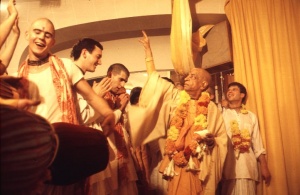SB 6.7.29-30: Difference between revisions
m (1 revision(s)) |
No edit summary |
||
| Line 1: | Line 1: | ||
{{info | {{info | ||
|speaker=Demigod King Indra and the Demigods | |speaker=Demigod King Indra and the Demigods | ||
|listener= | |listener=Viśvarūpa | ||
}} | }} | ||
[[Category:Srimad-Bhagavatam - Canto 06 Chapter 07]] | |||
[[Category:Bhagavatam Verses Spoken by Lord Indra and the Demigods - Vanisource|060729]] | |||
<div style="float:left">'''[[Srimad-Bhagavatam]] - [[SB 6|Sixth Canto]] - [[SB 6.7: Indra Offends His Spiritual Master, Brhaspati|Chapter 7: Indra Offends His Spiritual Master, Bṛhaspati]]'''</div> | |||
<div style="float:right">[[File:Go-previous.png|link=SB 6.7.28]] '''[[SB 6.7.28]] - [[SB 6.7.31]]''' [[File:Go-next.png|link=SB 6.7.31]]</div> | |||
{{RandomImage}} | |||
==== TEXTS 29-30 ==== | ==== TEXTS 29-30 ==== | ||
<div class="verse"> | |||
:ācāryo brahmaṇo mūrtiḥ | |||
:pitā mūrtiḥ prajāpateḥ | |||
:bhrātā marutpater mūrtir | |||
:mātā sākṣāt kṣites tanuḥ | |||
:dayāyā bhaginī mūrtir | |||
:dharmasyātmātithiḥ svayam | |||
:agner abhyāgato mūrtiḥ | |||
:sarva-bhūtāni cātmanaḥ | |||
dayāyā bhaginī mūrtir | |||
dharmasyātmātithiḥ svayam | |||
agner abhyāgato mūrtiḥ | |||
sarva-bhūtāni cātmanaḥ | |||
</div> | </div> | ||
| Line 21: | Line 27: | ||
==== SYNONYMS ==== | ==== SYNONYMS ==== | ||
<div class="synonyms"> | |||
<div | ''ācāryaḥ''—the teacher or spiritual master who instructs Vedic knowledge by his personal behavior; ''brahmaṇaḥ''—of all the ''Vedas''; ''mūrtiḥ''—the personification; ''pitā''—the father; ''mūrtiḥ''—the personification; ''prajāpateḥ''—of Lord Brahmā; ''bhrātā''—the brother; ''marut-pateḥ mūrtiḥ''—the personification of Indra; ''mātā''—the mother; ''sākṣāt''—directly; ''kṣiteḥ''—of the earth; ''tanuḥ''—the body; ''dayāyāḥ''—of mercy; ''bhaginī''—the sister; ''mūrtiḥ''—the personification; ''dharmasya''—of religious principles; ''ātma''—the self; ''atithiḥ''—the guest; ''svayam''—personally; ''agneḥ''—of the fire-god; ''abhyāgataḥ''—the invited guest; ''mūrtiḥ''—the personification; ''sarva-bhūtāni''—all living entities; ''ca''—and; ''ātmanaḥ''—of the Supreme Lord Viṣṇu. | ||
</div> | </div> | ||
| Line 29: | Line 34: | ||
==== TRANSLATION ==== | ==== TRANSLATION ==== | ||
<div class="translation"> | |||
<div | |||
The ācārya, the spiritual master who teaches all the Vedic knowledge and gives initiation by offering the sacred thread, is the personification of all the Vedas. Similarly, a father personifies Lord Brahmā; a brother, King Indra; a mother, the planet earth; and a sister, mercy. A guest personifies religious principles, an invited guest personifies the demigod Agni, and all living entities personify Lord Viṣṇu, the Supreme Personality of Godhead. | The ācārya, the spiritual master who teaches all the Vedic knowledge and gives initiation by offering the sacred thread, is the personification of all the Vedas. Similarly, a father personifies Lord Brahmā; a brother, King Indra; a mother, the planet earth; and a sister, mercy. A guest personifies religious principles, an invited guest personifies the demigod Agni, and all living entities personify Lord Viṣṇu, the Supreme Personality of Godhead. | ||
</div> | </div> | ||
| Line 37: | Line 41: | ||
==== PURPORT ==== | ==== PURPORT ==== | ||
<div class="purport"> | |||
According to the moral instructions of Cāṇakya Paṇḍita, ''ātmavat sarva-bhūteṣu:'' one should observe all living entities to be on the same level as oneself. This means that no one should be neglected as inferior; because Paramātmā is seated in everyone's body, everyone should be respected as a temple of the Supreme Personality of Godhead. This verse describes the different ways in which one should respect a ''guru'', a father, a brother, a sister, a guest and so on. | |||
</div> | |||
<div | |||
<div style="float:right; clear:both;">[[File:Go-previous.png|link=SB 6.7.28]] '''[[SB 6.7.28]] - [[SB 6.7.31]]''' [[File:Go-next.png|link=SB 6.7.31]]</div> | |||
</div> | __NOTOC__ | ||
__NOTOC__ | __NOEDITSECTION__ | ||
Revision as of 03:38, 13 May 2021

A.C. Bhaktivedanta Swami Prabhupada
TEXTS 29-30
- ācāryo brahmaṇo mūrtiḥ
- pitā mūrtiḥ prajāpateḥ
- bhrātā marutpater mūrtir
- mātā sākṣāt kṣites tanuḥ
- dayāyā bhaginī mūrtir
- dharmasyātmātithiḥ svayam
- agner abhyāgato mūrtiḥ
- sarva-bhūtāni cātmanaḥ
SYNONYMS
ācāryaḥ—the teacher or spiritual master who instructs Vedic knowledge by his personal behavior; brahmaṇaḥ—of all the Vedas; mūrtiḥ—the personification; pitā—the father; mūrtiḥ—the personification; prajāpateḥ—of Lord Brahmā; bhrātā—the brother; marut-pateḥ mūrtiḥ—the personification of Indra; mātā—the mother; sākṣāt—directly; kṣiteḥ—of the earth; tanuḥ—the body; dayāyāḥ—of mercy; bhaginī—the sister; mūrtiḥ—the personification; dharmasya—of religious principles; ātma—the self; atithiḥ—the guest; svayam—personally; agneḥ—of the fire-god; abhyāgataḥ—the invited guest; mūrtiḥ—the personification; sarva-bhūtāni—all living entities; ca—and; ātmanaḥ—of the Supreme Lord Viṣṇu.
TRANSLATION
The ācārya, the spiritual master who teaches all the Vedic knowledge and gives initiation by offering the sacred thread, is the personification of all the Vedas. Similarly, a father personifies Lord Brahmā; a brother, King Indra; a mother, the planet earth; and a sister, mercy. A guest personifies religious principles, an invited guest personifies the demigod Agni, and all living entities personify Lord Viṣṇu, the Supreme Personality of Godhead.
PURPORT
According to the moral instructions of Cāṇakya Paṇḍita, ātmavat sarva-bhūteṣu: one should observe all living entities to be on the same level as oneself. This means that no one should be neglected as inferior; because Paramātmā is seated in everyone's body, everyone should be respected as a temple of the Supreme Personality of Godhead. This verse describes the different ways in which one should respect a guru, a father, a brother, a sister, a guest and so on.